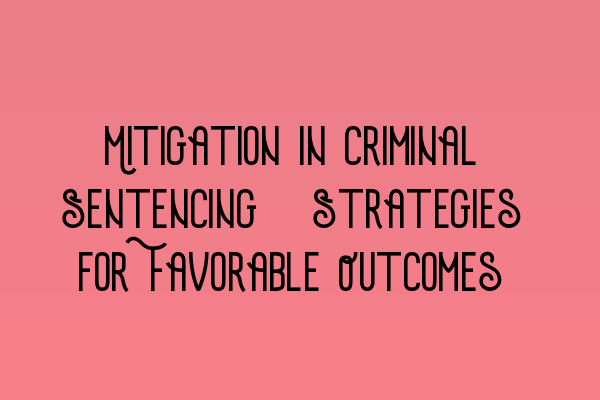Mitigation in Criminal Sentencing: Strategies for Favorable Outcomes
When it comes to criminal sentencing, the court takes into account various factors before determining the appropriate punishment. One such essential aspect is mitigation. Mitigation refers to the presentation of evidence or arguments that may lead to a reduction in the severity of the sentence imposed. In this blog post, we will explore effective mitigation strategies that can help achieve more favorable outcomes in criminal sentencing.
Understanding Mitigation
Before delving into the strategies, it is important to have a clear understanding of what mitigation entails. Mitigation encompasses any factors that may provide a valid reason for the court to show leniency or impose a lesser sentence. This can include personal circumstances, mental health issues, remorse, cooperation with law enforcement, and more.
When presenting mitigation, it is crucial to gather strong evidence and present it in a compelling manner. This can significantly influence the court’s decision-making process, potentially leading to a more favorable outcome.
Effective Mitigation Strategies
1. Personal Circumstances: Providing details about the defendant’s personal circumstances, such as their background, upbringing, and family situation, can help create a more nuanced and empathetic view of the accused. Demonstrating any difficult or challenging life experiences might help the court understand the defendant’s actions in a different light.
2. Rehabilitation Efforts: Highlighting the defendant’s efforts and progress in seeking rehabilitation can demonstrate a sincere desire to change and reintegrate into society. This can include attending therapy sessions, participating in educational programs, or seeking treatment for substance abuse problems. Such efforts can provide evidence of personal growth and a commitment to becoming a law-abiding individual.
3. Remorse and Accountability: Expressing genuine remorse for the offense committed and taking full responsibility for one’s actions can have a positive impact on the court’s perception. This can be achieved through a heartfelt apology, actions to make amends, and a clear demonstration of understanding the consequences of one’s behavior.
4. Cooperation with Law Enforcement: If the defendant cooperated fully and provided substantial assistance to law enforcement in the investigation or prosecution of other criminal activities, it is crucial to highlight this aspect. Cooperation can show a willingness to rectify past misconduct and contribute positively to the justice system.
Conclusion
When facing criminal sentencing, utilizing effective mitigation strategies is crucial for achieving positive outcomes. By presenting compelling evidence and arguments that demonstrate personal circumstances, rehabilitation efforts, remorse, and cooperation with law enforcement, it is possible to influence the court’s decision in a favorable manner.
At SQE Criminal Law & Practice Law UK, we offer comprehensive preparation courses for both the SQE 1 and SQE 2 examinations. To enhance your knowledge and skills in criminal law, we recommend checking out our SQE 1 Preparation Courses. Additionally, if you want to assess your progress and familiarize yourself with the exam format, take a look at our SQE 1 Practice Exam Questions and SQE 1 Practice Mocks FLK1 FLK2. Stay updated with the latest SRA SQE Exam Dates and start your preparation with confidence!
